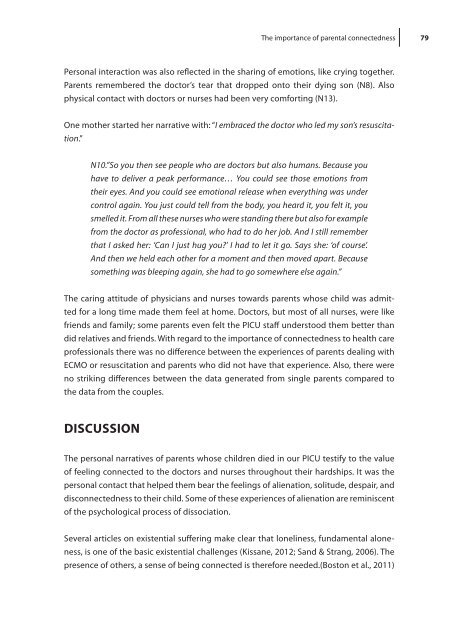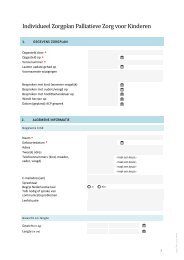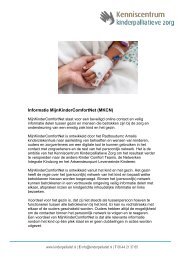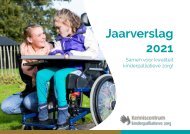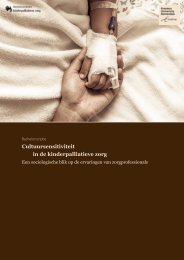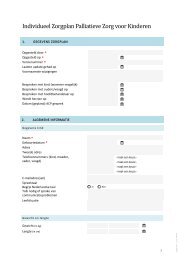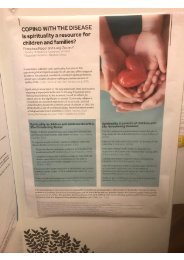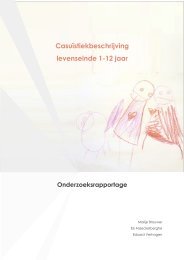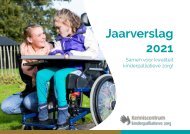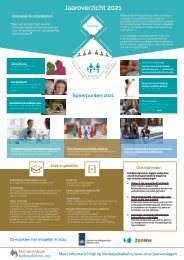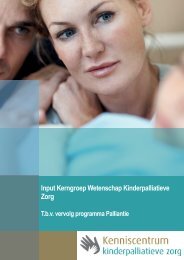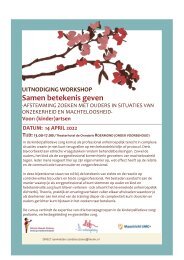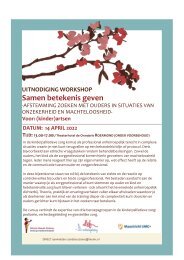Unveiling a fragile spirituality: Experiences of connectedness in pediatric palliative care
You also want an ePaper? Increase the reach of your titles
YUMPU automatically turns print PDFs into web optimized ePapers that Google loves.
The importance <strong>of</strong> parental <strong>connectedness</strong> 79<br />
Personal <strong>in</strong>teraction was also reflected <strong>in</strong> the shar<strong>in</strong>g <strong>of</strong> emotions, like cry<strong>in</strong>g together.<br />
Parents remembered the doctor’s tear that dropped onto their dy<strong>in</strong>g son (N8). Also<br />
physical contact with doctors or nurses had been very comfort<strong>in</strong>g (N13).<br />
One mother started her narrative with: “I embraced the doctor who led my son’s resuscitation.”<br />
N10.”So you then see people who are doctors but also humans. Because you<br />
have to deliver a peak performance… You could see those emotions from<br />
their eyes. And you could see emotional release when everyth<strong>in</strong>g was under<br />
control aga<strong>in</strong>. You just could tell from the body, you heard it, you felt it, you<br />
smelled it. From all these nurses who were stand<strong>in</strong>g there but also for example<br />
from the doctor as pr<strong>of</strong>essional, who had to do her job. And I still remember<br />
that I asked her: ‘Can I just hug you?’ I had to let it go. Says she: ‘<strong>of</strong> course’.<br />
And then we held each other for a moment and then moved apart. Because<br />
someth<strong>in</strong>g was bleep<strong>in</strong>g aga<strong>in</strong>, she had to go somewhere else aga<strong>in</strong>.”<br />
The car<strong>in</strong>g attitude <strong>of</strong> physicians and nurses towards parents whose child was admitted<br />
for a long time made them feel at home. Doctors, but most <strong>of</strong> all nurses, were like<br />
friends and family; some parents even felt the PICU staff understood them better than<br />
did relatives and friends. With regard to the importance <strong>of</strong> <strong>connectedness</strong> to health <strong>care</strong><br />
pr<strong>of</strong>essionals there was no difference between the experiences <strong>of</strong> parents deal<strong>in</strong>g with<br />
ECMO or resuscitation and parents who did not have that experience. Also, there were<br />
no strik<strong>in</strong>g differences between the data generated from s<strong>in</strong>gle parents compared to<br />
the data from the couples.<br />
DISCUSSION<br />
The personal narratives <strong>of</strong> parents whose children died <strong>in</strong> our PICU testify to the value<br />
<strong>of</strong> feel<strong>in</strong>g connected to the doctors and nurses throughout their hardships. It was the<br />
personal contact that helped them bear the feel<strong>in</strong>gs <strong>of</strong> alienation, solitude, despair, and<br />
dis<strong>connectedness</strong> to their child. Some <strong>of</strong> these experiences <strong>of</strong> alienation are rem<strong>in</strong>iscent<br />
<strong>of</strong> the psychological process <strong>of</strong> dissociation.<br />
Several articles on existential suffer<strong>in</strong>g make clear that lonel<strong>in</strong>ess, fundamental aloneness,<br />
is one <strong>of</strong> the basic existential challenges (Kissane, 2012; Sand & Strang, 2006). The<br />
presence <strong>of</strong> others, a sense <strong>of</strong> be<strong>in</strong>g connected is therefore needed.(Boston et al., 2011)


